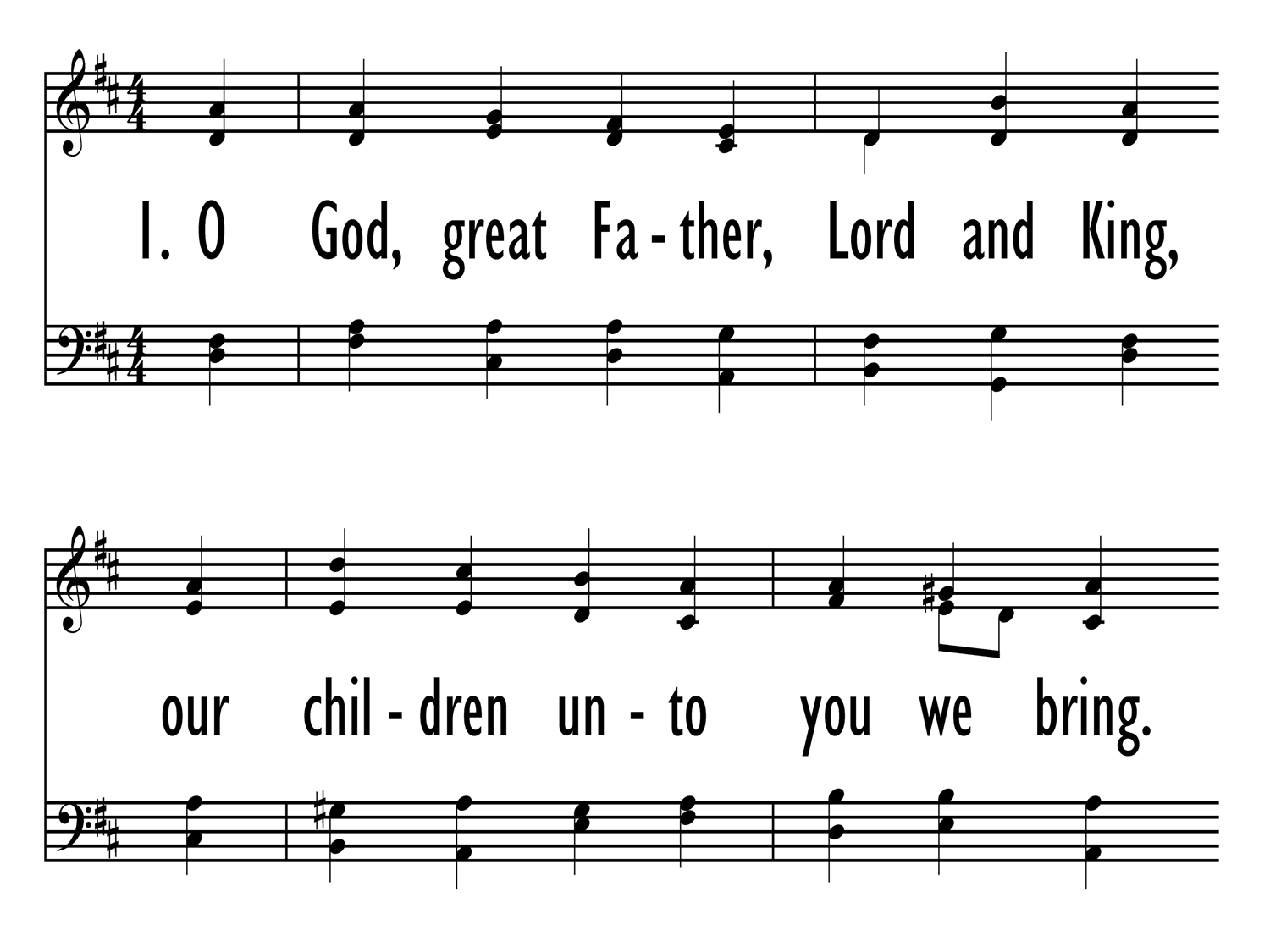- |
User Links
801
O God, Great Father, Lord and King
Hymn Information
- First Line
- O God, great Father, Lord and King
- Author
- E. Embree Hoss (1905, alt.)
- Tune Name
- MELCOMBE
- Composer
- Samuel Webbe (1783)
- Topic
- Elements of Worship: Baptism
Copyright Information
- Text Copyright
- Public Domain
- Tune Copyright
- Public Domain
- Reprint/Projection Information
- Words and Music: The Words and Music are in the Public Domain; you do not need permission to project or reprint the Words and Music.
Full Text
Scripture References
Thematically related:
- st. 1 =
- st. 2 =
- st. 3 =
- st. 4 =
- st. 5 =
Further Reflections on Scripture References
"O God, Great Father" alludes to the gospel story of bringing little children to Jesus, especially in stanzas 1 and 3 (Mark 10:13-16). The Reformed view of God's covenant shows up in stanza 2, and the work of the Holy Spirit appears in stanza 4.
Stanza 5 is similar to the consecration prayer that follows the act of baptism in the Psalter Hymnal's baptism forms.
Bert Polman, Psalter Hymnal Handbook
Confessions and Statements of Faith References
Further Reflections on Confessions and Statements of Faith References
The inclusion of children at baptism is taught in Heidelberg Catechism, Lord’s Day 27, Question and Answer 74 when it says, “Children as well as adults are included in God’s covenant and people” and Belgic Confession, Article 34 which says, “…our children ought to be baptized and sealed with the sign of the covenant…"
801
O God, Great Father, Lord and King
Additional Prayers
A Prayer for Children Being Baptized
O God, your Son loved children and made them our teachers in how to receive the gifts of your Kingdom. As a child receives nourishment and love from parents, so nourish and love our children through the blessed sacrament of baptism. Mark our children as lambs of your own fold. Bind them to your people forever. Lead them through life and death to their heart’s true home, which is your everlasting love through Jesus Christ our Lord. Amen.
—
Cornelius Plantinga, Jr.
801
O God, Great Father, Lord and King
Tune Information
- Name
- MELCOMBE
- Key
- D Major
- Meter
- 8.8.8.8
Recordings
801
O God, Great Father, Lord and King
Hymn Story/Background
"O God, Great Father" alludes to the gospel story of bringing little children to Jesus, especially in stanzas 1 and 3 (Mark 10:13-16). God’s covenant blessing is remembered and claimed in stanza 2, the work of the Holy Spirit is included in stanzas 4 and stanza 5 is a prayer that would appropriately follow baptism.
Methodist Bishop Elijah Embree Hoss wrote these words for a baptismal service he conducted in Walnut Ridge, Arkansas, in November 1903. The text was printed in the Nashville Christian Advocate in early 1904 and subsequently published in The Methodist Hymnal of 1905; Hoss served on the Joint Commission that produced this hymnal.
MELCOMBE was first used as an anonymous chant tune (with figured bass) in the Roman Catholic Mass and was published in 1782 in An Essay on the Church Plain Chant. It was first ascribed to Samuel Webbe and named MELCOMBE in Ralph Harrison's Sacred Harmony (1791), the first of many Protestant hymnals to contain this popular Roman Catholic tune. The tune title refers to Melcombe Regis, the northern part of Weymouth in Dorsetshire, England, made famous through frequent visits by King George III (1738-1820).
MELCOMBE has a steady rhythmic structure and a lot of stepwise intervals. The original setting had one dotted rhythm in the third phrase, which is deleted in many hymnals. The harmony borrows from Webbe's original bass line and from William H. Monk's harmonization of MELCOMBE for Hymns Ancient and Modern (1861). Sing this tune in two long lines, with a small pause at the end of the first to allow a breath before singing the second.
—
Bert Polman
Author Information
Elijah Embree Hoss (b. Washington County, TN, 1849; d. Muskogee, OK, 1919) was an ordained minister in the Methodist Episcopal Church South and served parishes in Knoxville, Tennessee; San Francisco, California; and Asheville, North Carolina. He was also professor of church history at Vanderbilt University, Nashville, Tennessee, and president of Emory and Henry College, Emory, Virginia.
—
Bert Polman
Composer Information
Samuel Webbe's (b. London, England, 1740; d. London, 1816) father died soon after Samuel was born without providing financial security for the family. Thus Webbe received little education and was apprenticed to a cabinetmaker at the age of eleven. However, he was determined to study and taught himself Latin, Greek, Hebrew, French, German, and Italian while working on his apprenticeship. He also worked as a music copyist and received musical training from Carl Barbant, organist at the Bavarian Embassy. Restricted at this time in England, Roman Catholic worship was freely permitted in the foreign embassies. Because Webbe was Roman Catholic, he became organist at the Portuguese Chapel and later at the Sardinian and Spanish chapels in their respective embassies. He wrote much music for Roman Catholic services and composed hymn tunes, motets, and madrigals. Webbe is considered an outstanding composer of glees and catches, as is evident in his nine published collections of these smaller choral works. He also published A Collection of Sacred Music (c. 1790), A Collection of Masses for Small Choirs (1792), and, with his son Samuel (the younger), Antiphons in Six Books of Anthems (1818).
—
Bert Polman
Suggestions or corrections? Contact us


 My Starred Hymns
My Starred Hymns






